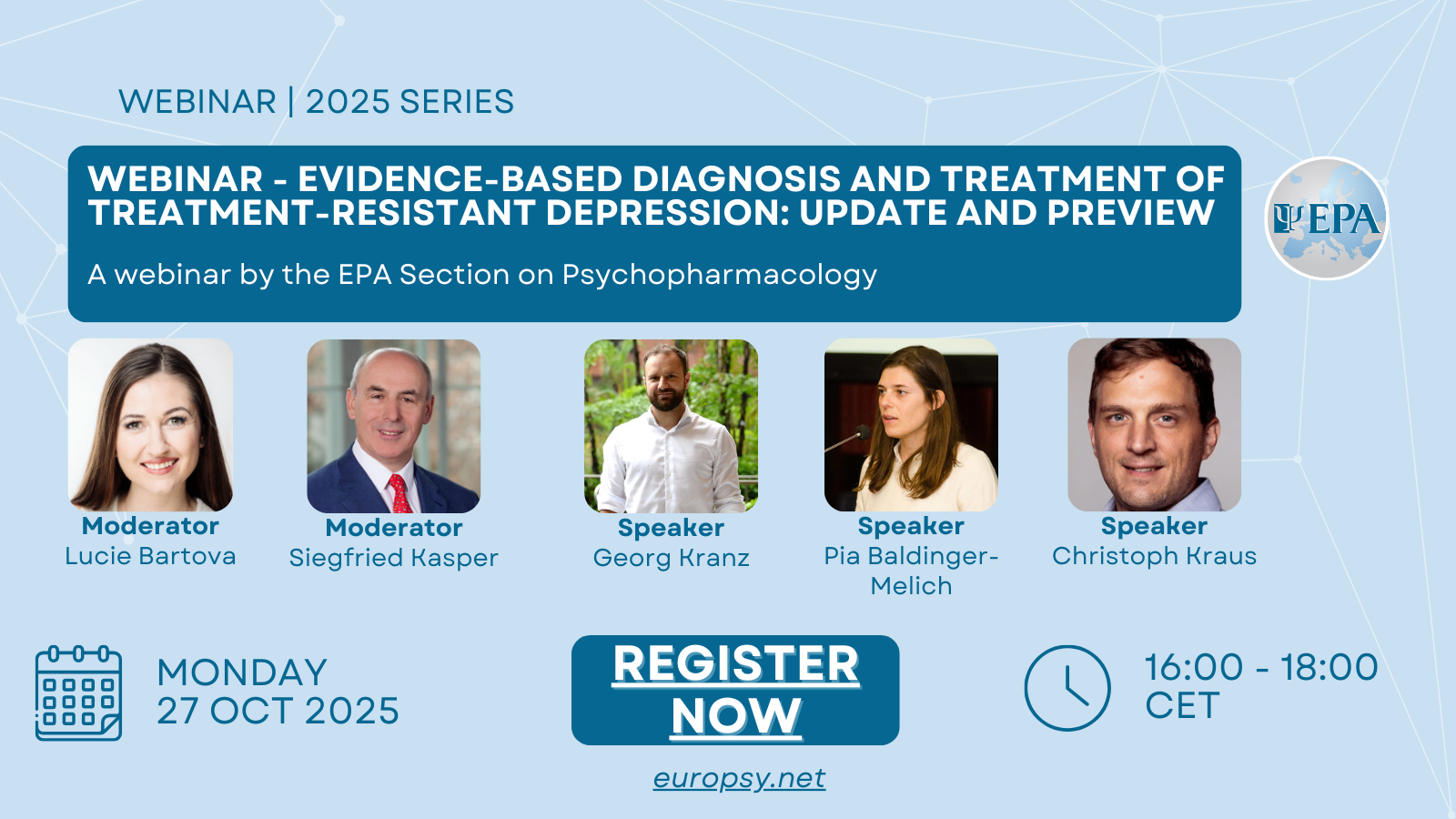Evidence-Based Diagnosis and Treatment of Treatment-Resistant Depression – Update and Preview
A webinar by the EPA Section on Psychopharmacology
For European Depression Day, the EPA is pleased to announce the webinar “Evidence-Based Diagnosis and Treatment of Treatment-Resistant Depression – Update and Preview”, taking place on Monday, 27 October 2025, from 16:00 to 18:00 CET. This webinar is organised by the EPA Section on Psychopharmacology.
Missed THE webinar or want to watch it again?
The EPA 2025 Webinar Series recordings are freely accessible on our e-Learning platform to all EPA paid-up members, offering exclusive, on-demand access to the full sessions from this year’s expert-led webinars.
details
Title: Evidence-Based Diagnosis and Treatment of Treatment-Resistant Depression – Update and Preview
Date: Monday 27 October 2025
Time: 16:00 – 18:00 CET
Platform: Zoom
Registrations: Closed
KEY LEARNING OBJECTIVES
This webinar will enable the attendees to gain knowledge on the evidence-based diagnostics and treatment of the so-called TRD. Besides the introduction of the clinical phenotype of TRD, a detailed information will be provided for the approved as well as experimental pharmacological and non-pharmacological treatment strategies, as well as their best possibly effective and safe use in TRD according to the recommended therapeutic algorithms.
Programme
16:00 – 16:05 | Lucie Bartova – Welcome and Introduction
16:05 – 16:10 | Sigfried Kasper – Context and Introduction of Speakers
16:10 – 16:30 | Georg Kranz – From Trials to Practice: Contemporary Evidence for TMS in TRD
16:30 – 16:40 | Q&A and Discussion
16:40 – 17:00 | Pia Baldinger-Melich – Electroconvulsive therapy in the age of ketamine: revisiting gold standards in TRD
17:00 – 17:10 | Q&A and Discussion
17:10 – 17:30 | Christoph Kraus – Treating Advanced Stages of Major Depressive Disorder – What should I do with Patients Who stay Depressed Despite all Treatments?
17:30 – 17:45 | Q&A and Discussion
17:45 – 18:00 | Lucie Bartova & Sigfried Kasper – Wrap-up and conclusions
ABSTRACT
Major depressive disorder (MDD) affects over 300 million people worldwide. The so-called treatment-resistant depression (TRD) represents a subgroup of this condition, but inconsistent international definitions make it difficult to estimate its exact prevalence.
TRD is not always identified in a timely manner and is often mistakenly attributed to psychosocial factors. Hence, the initial exclusion of the so-called pseudo-resistance is of utmost importance. The EMA defines TRD as the lack of response to two or more consecutive antidepressants from the same or different substance classes, administered at a sufficient dose and for an adequate period of at least four weeks to adherent patients. Accordingly, about one-third of patients with MDD experiences resistance to traditional, predominantly monoaminergic antidepressants. The frequently associated increased mortality and disease burden, reflected in higher suicide rates and frequent comorbidities, underscore the need for timely, individualized, and evidence-based treatment.
In addition to conventional antidepressant psychopharmacotherapy including recommended augmentation and combination strategies, innovative pharmacological developments such as Esketamine nasal spray have already been used very effectively in the clinical routine. Due to its rapid and sustained antidepressant and also anti-suicidal effects, other promising substances targeting glutamatergic or GABAergic systems have increasingly been investigated. Experimental approaches with psychedelics still require further research and its scientifically rigorous interpretation.
While the well-researched electroconvulsive therapy remains the gold standard in the treatment of TRD, other neurostimulation techniques, such as repetitive transcranial magnetic stimulation, vagus nerve stimulation, or deep brain stimulation, can also be individually considered within the treatment algorithm for MDD and TRD.
Moderators
- Lucie Bartova, Secretary of the EPA Section on Psychopharmacology, Department of Psychiatry and Psychotherapy; Comprehensive Center for Clinical Neurosciences and Mental Health at the Medical University of Vienna, Vienna, Austria – Biography
- Siegfried Kasper, Department of Psychiatry and Psychotherapy; Comprehensive Center for Clinical Neurosciences and Mental Health; Center for Brain Research at the Medical University of Vienna, Vienna, Austria – Biography
Speakers
- Georg Kranz, Department of Rehabilitation Sciences, The Hong Kong Polytechnic University, Hung Hom, Hong Kong; Department of Psychiatry and Psychotherapy, Comprehensive Center for Clinical Neurosciences and Mental Health at the Medical University of Vienna, Vienna, Austria – Biography
- Pia Baldinger-Melich, Department of Psychiatry and Psychotherapy, Comprehensive Center for Clinical Neurosciences and Mental Health at the Medical University of Vienna, Vienna, Austria – Biography
- Christoph Kraus, Department of Psychiatry and Psychotherapy, Comprehensive Center for Clinical Neurosciences and Mental Health at the Medical University of Vienna, Vienna, Austria – Biography
Additional resources
(Optional) literature to read that is associated with the topics presented during the webinar:
- McIntyre RS, Alsuwaidan M, Baune BT, Berk M, Demyttenaere K, Goldberg JF, Gorwood P, Ho R, Kasper S, Kennedy SH, Ly-Uson J, Mansur RB, McAllister-Williams RH, Murrough JW, Nemeroff CB, Nierenberg AA, Rosenblat JD, Sanacora G, Schatzberg AF, Shelton R, Stahl SM, Trivedi MH, Vieta E, Vinberg M, Williams N, Young AH, Maj M. Treatment-resistant depression: definition, prevalence, detection, management, and investigational interventions. World Psychiatry. 2023 Oct;22(3):394-412. doi: 10.1002/wps.21120. PMID: 37713549; PMCID: PMC10503923.
- Bartova L, Dold M, Kautzky A, Fabbri C, Spies M, Serretti A, Souery D, Mendlewicz J, Zohar J, Montgomery S, Schosser A, Kasper S. Results of the European Group for the Study of Resistant Depression (GSRD) – basis for further research and clinical practice. World J Biol Psychiatry. 2019 Jul;20(6):427-448. doi: 10.1080/15622975.2019.1635270. Epub 2019 Jul 25. PMID: 31340696.
- Kraus C, Kadriu B, Lanzenberger R, Zarate CA Jr, Kasper S. Prognosis and improved outcomes in major depression: a review. Transl Psychiatry. 2019 Apr 3;9(1):127. doi: 10.1038/s41398-019-0460-3. PMID: 30944309; PMCID: PMC6447556.
- Buchmayer F, Kasper S. Overcoming the myths of esketamine administration: different and not difficult. Front Psychiatry. 2023 Nov 23;14:1279657. doi: 10.3389/fpsyt.2023.1279657. PMID: 38076689; PMCID: PMC10701548.
- Jin MX, Qin PP, Xia AWL, Kan RLD, Zhang BBB, Tang AHP, Li ASM, Lin TTZ, Giron CG, Pei JJ, Kranz GS. Neurophysiological and neuroimaging markers of repetitive transcranial magnetic stimulation treatment response in major depressive disorder: A systematic review and meta-analysis of predictive modeling studies. Neurosci Biobehav Rev. 2024 Jul;162:105695. doi: 10.1016/j.neubiorev.2024.105695. Epub 2024 May 4. PMID: 38710424.
- Baldinger-Melich P, Spies M, Bozic I, Kasper S, Rujescu D, Frey R. Perspectives in treatment-resistant depression: esketamine and electroconvulsive therapy. Wien Klin Wochenschr. 2024 Apr 17. doi: 10.1007/s00508-024-02358-w. Epub ahead of print. PMID: 38662240.
- Zilles-Wegner D, Sartorius A. Elektrokonvulsionstherapie in der neuen NVL Depression: vom Unterschied zwischen Effektivität, Evidenz und Empfehlungsgraden [Electroconvulsive Therapy in the New National Guideline Depression: Effectiveness, Evidence, and Grade of Recommendation]. Fortschr Neurol Psychiatr. 2023 May;91(5):209-212. German. doi: 10.1055/a-2046-5279. Epub 2023 May 16. PMID: 37192610.

